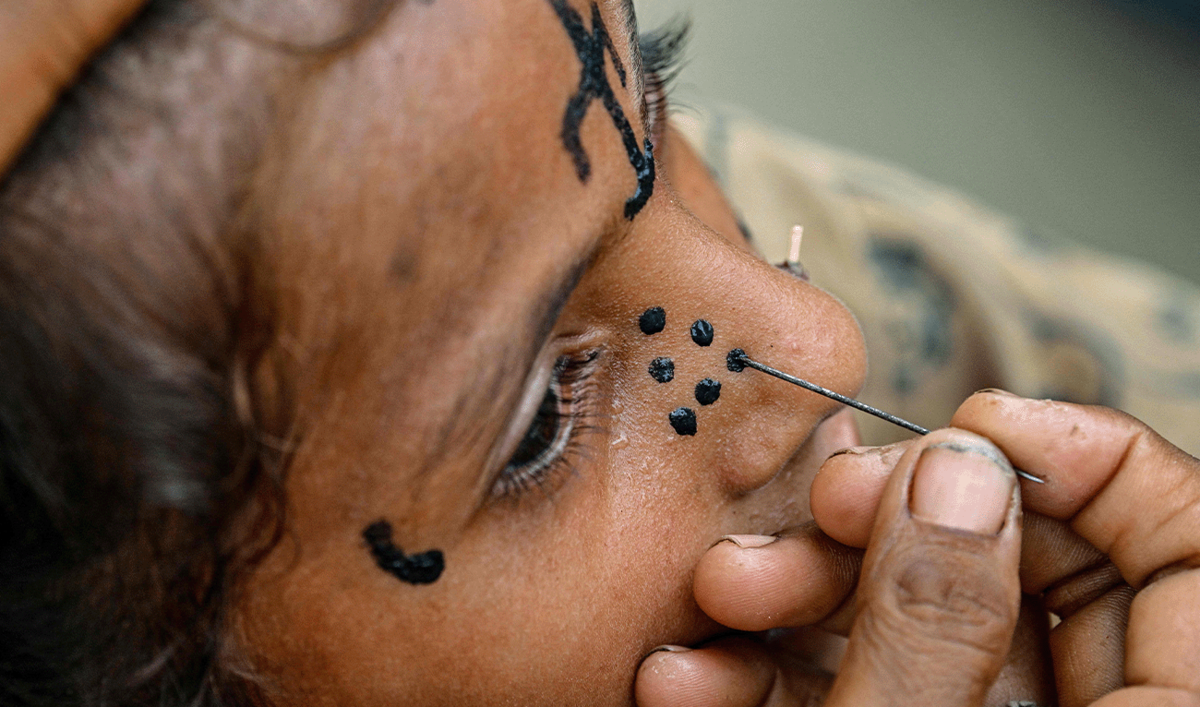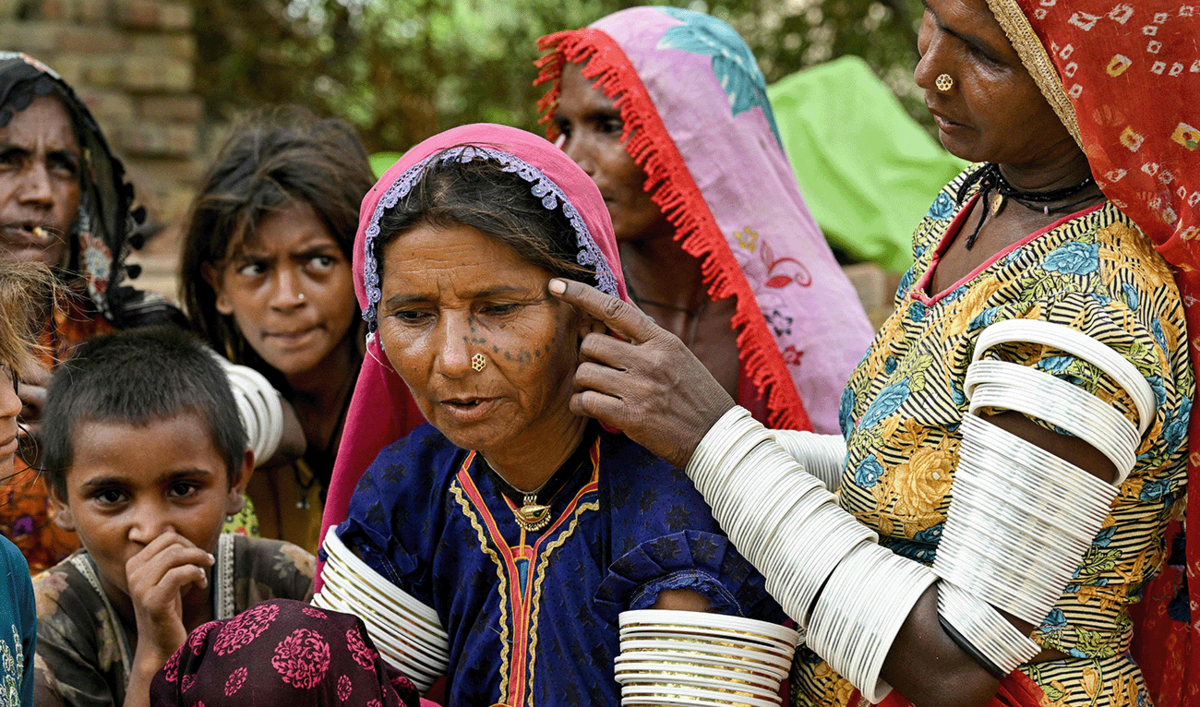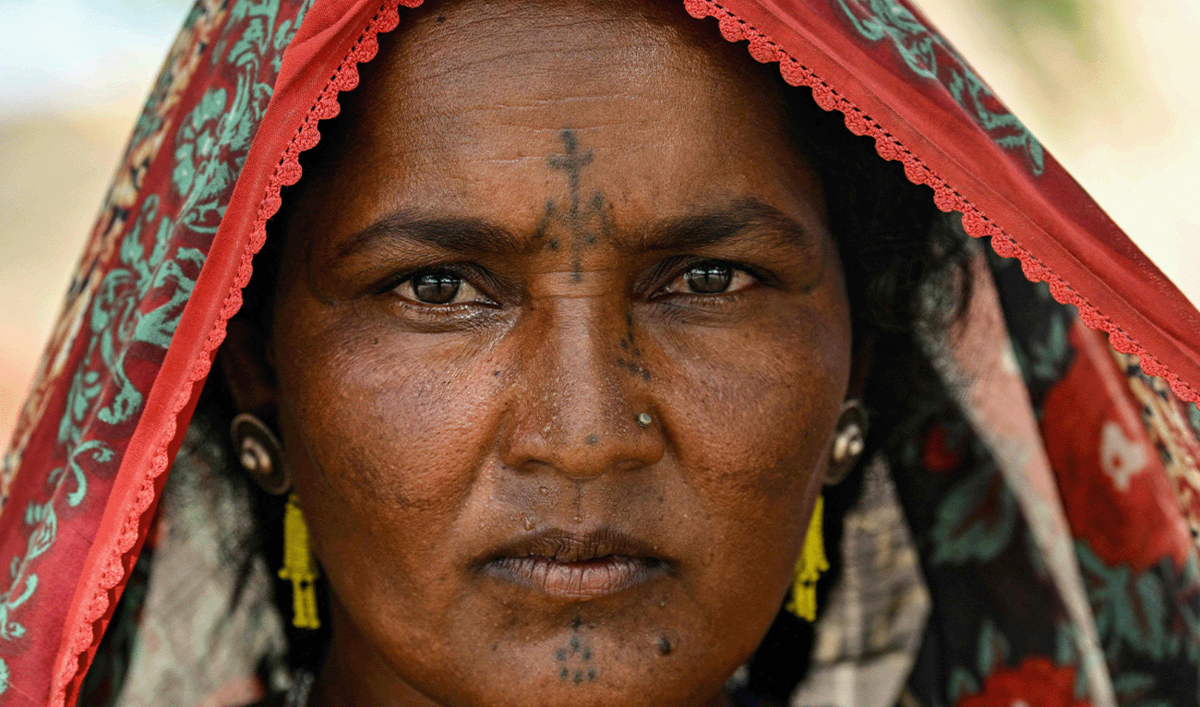UMERKOT, Pakistan: Grinding charcoal with a few drops of goatÔÇÖs milk, 60-year-old Basran Jogi peers at the faces of two small Pakistani sisters preparing for their first tattoos.
The practice of elder women needling delicate shapes onto the faces, hands, and arms of younger generations stretches back centuries in the Hindu villages that dot the southern border with India.
ÔÇ£First draw two straight lines between the eyebrows,ÔÇØ Jogi instructs her friend poised with a sewing needle.
ÔÇ£Now insert the needle along the lines ÔÇö but slowly, until it bleeds.ÔÇØ
Six-year-old Pooja barely winces as dotted circles and triangles are tattooed onto her chin and forehead.

This photograph taken on July 14, 2025 shows artist Guddi Manthar, drawing an indigenous tattoo on seven-year-old Champa's face at the Jogi Colony in Umerkot, a Hindu-majority district in Pakistan. (AFP/File)
On the outskirts of the rural town of Umerkot in Sindh province, her seven-year-old sister Champa declares eagerly beside her that ÔÇ£I am ready too.ÔÇØ
In recent years, however, as rural Hindu communities in Muslim-majority Pakistan become more connected to nearby cities, many young women have opted out of the ÔÇ£old ways.ÔÇØ
ÔÇ£These signs set us apart from others,ÔÇØ said 20-year-old Durga Prem, a computer science student who grew up in the nearby city of Badin.
ÔÇ£Our generation doesnÔÇÖt like them anymore. In the age of social media, young girls avoid facial tattoos because they think these marks will make them look different or unattractive.ÔÇØ
Her sister Mumta has also refused to accept the tattoos that mark their mother and grandmothers.
ÔÇ£But if we were still in the village, we might have had these marks on our faces or arms,ÔÇØ she reflects.

This photograph taken on July 14, 2025 shows a villager in traditional attire pointing to an indigenous tattoo inked on Reshma's (C) face at the Ponjo Kolhi village, about 30 km from Umerkot, a Hindu-majority district in Pakistan. (AFP/File)
Just two percent of PakistanÔÇÖs 240 million people are Hindu, and the majority live in rural areas of southern Sindh province.
Discrimination against minorities runs deep and Hindu activist Mukesh Meghwar, a prominent voice for religious harmony, believes younger generations do not want to be instantly identified as Hindu in public.
Many Muslims believe tattoos are not permissible in Islam, and even those who have them rarely display them in public.
ÔÇ£We canÔÇÖt force our girls to continue this practice,ÔÇØ Meghwar told AFP. ÔÇ£ItÔÇÖs their choice. But unfortunately, we may be the last generation to see tattoos on our womenÔÇÖs faces, necks, hands, and arms,ÔÇØ he said.
Few Hindus that AFP spoke with recalled the meaning behind the practice of tattoos or when it began, but anthropologists believe it has been part of their cultural heritage for hundreds of years.

This photograph taken on July 15, 2025 shows Aklan Jogi, posing for the camera as she adorns an indigenous tattoo inked on her face at the Sodo Jogi Colony in Umerkot, a Hindu-majority district in Pakistan. (AFP/File)
ÔÇ£These symbols are part of the culture of people who trace their roots to the Indus civilization,ÔÇØ anthropologist Zulfiqar Ali Kalhoro told AFP, referring to a Bronze Age period that pre-dates modern religion.
ÔÇ£These ÔÇÿmarksÔÇÖ were traditionally used to identify members of a communityÔÇØ and to ÔÇ£ward off evil spirits,ÔÇØ he adds.
Admiring the work on the grinning faces of the two little sisters, elder Jogi agreed that it was an ancestral tradition that enhanced the beauty of women.
ÔÇ£We donÔÇÖt make them for any specific reason ÔÇö itÔÇÖs a practice that has continued for years. This is our passion,ÔÇØ she told AFP.
The marks that begin dark black quickly fade to a deep green color, but last a lifetime.
ÔÇ£They belong to us,ÔÇØ said Jamna Kolhi, who received her first tattoos as a young girl alongside Jogi.
ÔÇ£These were drawn by my childhood friend ÔÇö she passed away a few years ago,ÔÇØ 40-year-old Jamna Kolhi told AFP.
ÔÇ£Whenever I see these tattoos, I remember her and those old days. ItÔÇÖs a lifelong remembrance.ÔÇØ
















